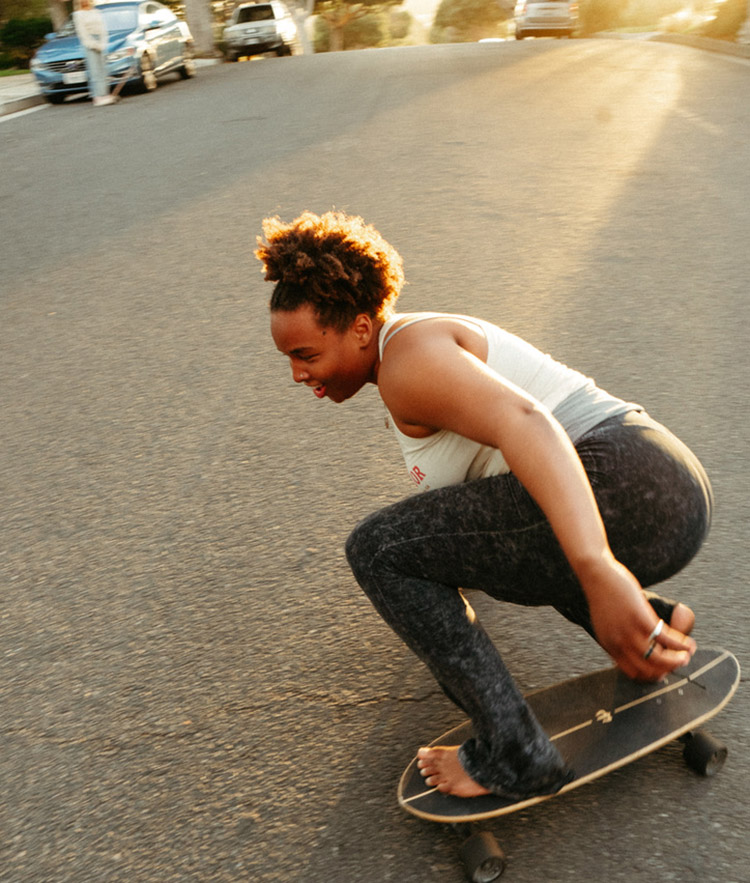
From Mattering to Mobilizing: On the evolution of our skate study research
By Zoë Corwin
A year ago, I wrote about a new participatory action research study (PAR) we had just launched through the Pullias Center called Mattering in the Margins: Skateboarders’ Stories of Mental Health Challenges and Opportunities. The study expanded on findings from a prior national study intended to better understand the experiences of youth who skateboard called Beyond the Board. The PAR project, run during the isolated days of the pandemic, brought together a team of faculty and graduate students from six USC schools, a professor from UNLV’s Department of Psychology and Higher Education, and 20 Los Angeles skateboarders (ages 18-30) to learn about how skateboarding affects mental health and community. Twelve months later, I marvel at the lessons I continue to learn from the skate community – and the applicability of those lessons to broader efforts to meet the needs of young people who have been racialized, gendered and marginalized by educational institutions – and society at large.
As with any PAR study, our team has thought deeply about how to share research findings with diverse audiences. Most recently, Stefani Relles, Jordan Harper and I had the pleasure of sharing a paper at AERA about our research methods – likely the first time skateboarding had appeared in the AERA program. Our Annenberg colleague, Neftalie Williams, recently shared findings at the North American Society for the Sociology of Sport and will do so again at the International Communication Association annual meeting. To bring our skate collaborators’ voices into these spaces has been a deeply gratifying experience. Education researchers and sports sociologists who had not previously considered skateboarders’ perspectives appreciated hearing their insights.
In some regards, sharing findings with academic audiences is the easy part – how to share findings with the skate world is more challenging. Thus far, our approach entails video stories including (1) a series of individual stories, recorded and curated by our skate co-researchers; (2) a video version of study findings highlighting the ways that skaters experience hurt and healing; and (3) a video reflection on the significance of the study and an overview of our research methods.
One of the study’s most salient findings is that despite often not feeling seen or heard and/or feeling misunderstood, skaters are often successful in carving out opportunities to cultivate uplifting experiences – sometimes in community with other skaters, and other times in solitude. This tension between navigating challenges and embracing fun has informed our newest effort funded by USC’s Office of the Provost – a collaborative on embedding mental health resources in non-traditional spaces.
The collaborative, initiated in the fall of 2021, is designed to reimagine the ways young adults in Los Angeles find support for their mental health and well being. We were inspired by a novel Colombian program to embed “escuchaderos,” or listening centers, in urban spaces – an innovative mental health initiative that established drop-in centers in Metro stations throughout Medellín where counselors provide free counseling. We are exploring the feasibility of establishing a similar initiative in Los Angeles. Can we meet young people where they enjoy spending time and offer access to mental health resources? Can USC faculty and community partners figure out ways to facilitate access to mental health professionals in skate shops, parks or shopping centers? Can we offer listening centers in areas with high numbers of unsheltered people? Or in parking lots where day laborers gather? Or adjacent to our own campus? What would those spaces look like? Who would staff them? How would they be sustained? Would they involve digital elements?
In order to imagine responses to these questions, we’ve been holding a series of Zoom conversations with faculty and students from six USC schools and community partners such as Urban Warehouse, Pushin’ Forward, Skatepark Project, Exposure, Relational Center and Surf Circle. The conversations, held each Tuesday at 8am PDT through the end of May, have been ‘open-access’ to anyone who wants to attend and are advertised through the study’s Instagram account, @uscskatestudy. Consequently, we’ve welcomed participants from across the country into our discussions. We’re drawing on the expertise of participating collaborators to imagine what innovative, community-based mental health service provision might look like for our students and neighbors in the greater Los Angeles area.
At this point, one approach we’re considering involves converting a bus into a mobile wellness space that includes a podcast studio, social workers who resonate with communities served, incredible artwork from skaters from the Garage Board Shop, and good snacks – got to have good snacks! Fueled by a strong commitment to meet the needs of people who identify as BIPOC and/or gender diverse, and recognizing the importance of expanding wellness services into high poverty areas, our collaborative will soon move from conceptualizing the wellness space to building it out – and then piloting it with our community partners. Stay tuned to see how this journey unfolds– or better yet, join us!